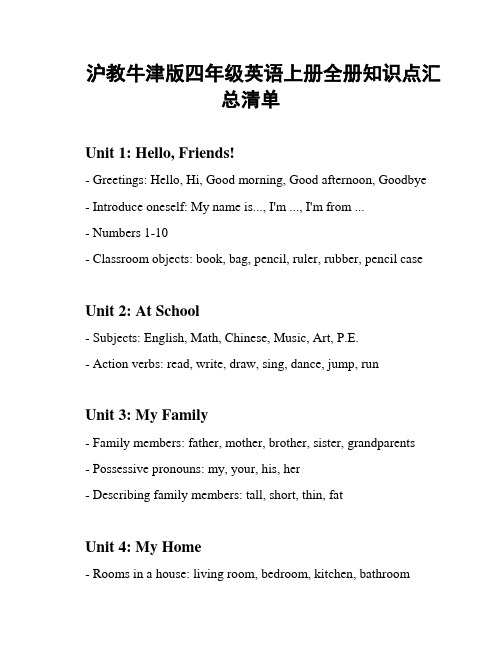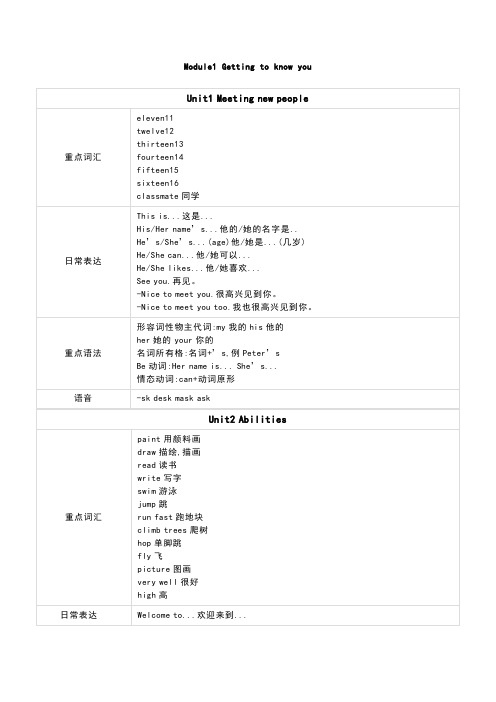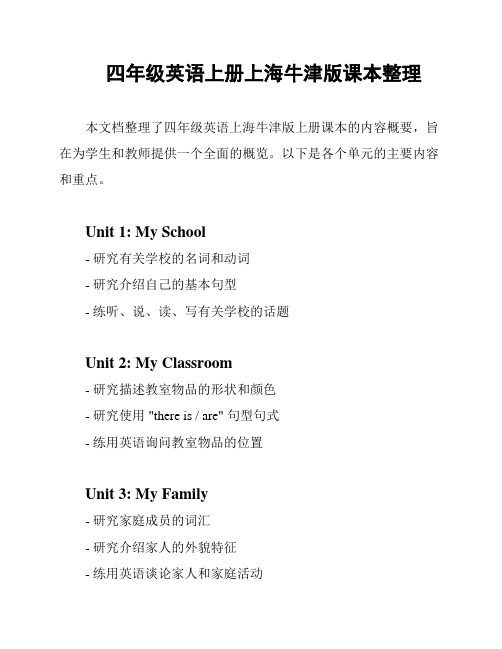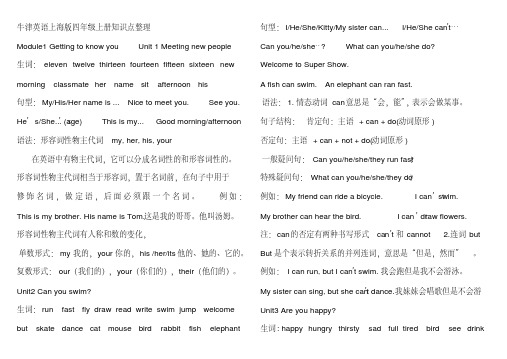最新牛津英语上海版四年级上册知识点整理
沪教牛津版四年级英语上册全册知识点汇总清单

沪教牛津版四年级英语上册全册知识点汇总清单Unit 1: Hello, Friends!- Greetings: Hello, Hi, Good morning, Good afternoon, Goodbye - Introduce oneself: My name is..., I'm ..., I'm from ...- Numbers 1-10- Classroom objects: book, bag, pencil, ruler, rubber, pencil caseUnit 2: At School- Subjects: English, Math, Chinese, Music, Art, P.E.- Action verbs: read, write, draw, sing, dance, jump, runUnit 3: My Family- Family members: father, mother, brother, sister, grandparents- Possessive pronouns: my, your, his, her- Describing family members: tall, short, thin, fatUnit 4: My Home- Rooms in a house: living room, bedroom, kitchen, bathroom- Furniture: sofa, bed, table, chair- Prepositions of place: in, on, under, behindUnit 5: Food and Drinks- Food and drinks vocabulary: noodles, rice, bread, milk, juice, water- Expressing likes and dislikes: I like..., I don't like..., Do you like...?Unit 6: Toys and Games- Toys vocabulary: ball, doll, teddy bear, robot, car- Indoor and outdoor games: hide-and-seek, catch, jump rope, kickball- Expressing preferences: I prefer..., I don't prefer...Unit 7: My Body- Parts of the body: head, eyes, nose, mouth, arms, legs- Action verbs: see, hear, smell, taste, touch, speak, walk, jump- Asking and answering about body parts: What can you see with? I can see with my eyes.Unit 8: Clothes- Clothing vocabulary: T-shirt, dress, skirt, trousers, shoes- Colors: red, blue, yellow, green, orange, purple- Describing clothes: big, small, long, short, new, oldUnit 9: Weather- Weather vocabulary: sunny, rainy, cloudy, windy, snowy- Expressing feelings about weather: I like sunny days. I don't like rainy days.Unit 10: Holidays and Festivals- Holidays and festivals: Christmas, New Year, Spring Festival- Traditional activities: giving presents, fireworks, lion dance- Expressing holiday greetings and wishes: Merry Christmas, Happy New Year, Happy Spring Festival。
沪教牛津版四年级英语上册全册知识点汇总

沪教牛津版四年级英语上册全册知识点汇总Module 1: Getting to Know YouIn this module。
we will learn some core vocabulary。
phrases。
and XXX to help us get to know each other better.Core Vocabulary1.Nouns: morning。
classmate。
name。
afternoon。
woof。
bird。
bottle2.Verbs: meet。
run。
fly。
draw。
write。
jump。
e。
see。
drink。
sit3.Possessive Adjectives: his。
her4.Adjectives: happy。
sad。
tired。
hungry。
full。
thirsty。
new5.Other: fastXXX1.Nouns: noon。
evening2.Possessive Adjectives: my。
your。
its。
our。
their Core Phrases1.XXX2.New classmate3.Her name4.My name5.Run fast6.XXX…7.Write one’s name8.Have some biscuits9.Have some waterCore Sentence Structures1.Nice to meet you.This XXX for the first time。
When you say “Nice to meet you,” the other person will usually respond with “Nice to meet you。
too.”XXX: Nice to meet you。
Li Wei.Nice to meet you。
too.2.His name’s Joe.This XXX’s name。
[全]沪教牛津版四年级英语上全册单元知识点考点总结
![[全]沪教牛津版四年级英语上全册单元知识点考点总结](https://img.taocdn.com/s3/m/3b50c2f1ee06eff9aff80759.png)
沪教牛津版四年级英语上全册单元知识点考点总结Unit l Meeting new people知识梳理一、Words:1.meet结识2.new新的3.morning早晨4.classmate同班同学5. her她的6.name名字7.sit坐8.afternoon下午9.his他的10. boy男孩11. here这里12. sister姐姐,妹妹13. girl女孩14. brother兄弟15. nice好的二、Phrases:1. good morning早上好2.good afternoon下午好3.sit here坐在这儿4.your new classmate你的新同学5.my name我的名字6.my classmate我的同学7.her name她的名字8.his name他的名字三、Sentences:1.Nice to meet you.见到你很高兴。
2.My name is Jill.或My name's Jill.我的名字叫Jill。
3.This is your new classmate.这是你的新同学。
4.Her name's Kitty.她的名字叫Kitty。
5.You can sit here.你可以坐在这儿。
6.This is my brother.这是我的兄弟。
7.What about you? 你呢?/你怎么样呢?重点点拨1.Nice to meet you.在第一次见面相互认识时经常会用这句话来问候对方,回答时经常会说Nice to meet you,too.2.注意形容词性物主代词(简称“形物代”)的使用:my(我的),your(你的),his(他的),her(她的),its(它的),our(我们的),your(你们的),their(他们的,她们的,它们的):这些形容词性物主代词后面一定要接名词,即要接人或物。
单词播音园大声朗读下列短文,体会粗写的单词中字母a的发音/eɪ/。
牛津英语上海版四年级上册教学要点整理

牛津英语上海版四年级上册教学要点整理教学目标- 帮助学生熟练掌握四年级上册的英语单词和句子- 培养学生的听、说、读、写的综合能力- 培养学生的研究兴趣和自信心教学内容- 研究问候语和介绍自己的句子- 掌握单词:hello, hi, my name is, nice to meet youUnit 2: I Love My Family- 研究家庭成员的称呼和描述- 掌握单词:father, mother, brother, sister, grandfather, grandmother, familyUnit 3: At School- 研究学校的场景和相关句子- 掌握单词:school, classroom, teacher, student, desk, chair, book, pen, pencilUnit 4: The Weather- 研究天气情况的表达- 掌握单词:sunny, cloudy, rainy, snowy, windy, weatherUnit 5: My Day- 研究描述一天中不同活动的句子- 掌握单词:get up, have breakfast/lunch/dinner, go to school/home, play, do homework教学方法- 多听、多说、多读、多写- 创设情境,帮助学生理解和运用所学知识- 组织小组活动和角色扮演,提高学生的口语表达能力- 使用多媒体教具和教材辅助教学教学评价- 结合听力、口语、阅读、写作等方面的考核- 及时反馈学生的研究情况,并给予相应的指导和鼓励- 通过定期测试和作业评分,对学生的研究成果进行评价以上是牛津英语上海版四年级上册的教学要点整理,请根据实际情况进行教学策略的调整和安排。
祝教学顺利!。
“牛津上海版”小学英语四年级(上)知识点大全

always 总是
日常表达 重点语法
语音
Merry Christmas!圣诞节快乐!
特殊疑问句: -How’s the weather in...?-It’s... What are they? Be 动词:It’s... There be 句型:There are... 情态动词:can 一般疑问句: A:Do you like...? B:Yes,I do./No,I don’t.
特殊疑问句:How do you feel? 表达感受的形容词: happy,sad,thirsty... Be 动词:I’m...We’re...He’s... A:How do you feel? B:I’m/We're happy,sad,thirsty...
名词所有格:名词+’s,例 Ginger’s There be 句型:There is/are... 一般疑问句:Are you...? 祈使句:动词原形开头,例 Come in, please.请进。
canteen 餐厅 computer lab 机房 office 办公室 gym 体育馆 behind 在...后面 in front of 在...前面 building 建筑物 lesson 课程 lunch 午餐 hall 礼堂;大厅 playground 操场 classroom 教室 library 图书馆 cupboard 橱柜 bookshelf 书架 desk and chair 桌椅 pencil case 铅笔盒 rubber 橡皮 pencil 铅笔 notebook 笔记本
Module4 The natural world
重点词汇
重点语法 语音
重点词汇
Unit1 A visit to a farm
牛津英语上海版四年级上册知识点整理

牛津英语上海版四年级上册知识点整理?Module1?Getting?to?know?you? Unit?1?Meeting?new?people 生词:?eleven?twelve??thirteen??fourteen??fif teen??sixteen newmorning classmate her name sit afternoon his句型:My/His/Her name is ... Nice to meet you. See you. He’s/She’s ... (age)This?is?my...Goodmorning/afternoon语法:形容词性物主代词?my,?her,?his,?your????????在英语中有物主代词,它可以分成名词性的和形容词性的。
形容词性物主代词相当于形容词,置于名词前,在句子中用于修饰名词,做定语,后面必须跟一个名词。
????????例如:This?is?my?brother.?His?name?is ?Tom.?这是我的哥哥。
他叫汤姆。
形容词性物主代词有人称和数的变化,??单数形式:my 我的,your 你的,his?/her/its 他的、她的、它的。
复数形式:our (我们的),your (你们的),their (他们的)。
??? Unit2?Can you swim?? 生词:runfastfly??draw??read??write??swim??j ump? welcomebut skate dance cat mouse bird rabbit fish elephant 句型:I/He/She/Kitty/My sister can... I/He/She can ’t … Can you/he/she …? What can you/he/she do?Welcome to Super Show. A fish can swim. An elephant can ran fast.?语法:?1.?情态动词can?意思是“会,能”,表示会做某事。
四年级英语上册上海牛津版课本整理

四年级英语上册上海牛津版课本整理本文档整理了四年级英语上海牛津版上册课本的内容概要,旨在为学生和教师提供一个全面的概览。
以下是各个单元的主要内容和重点。
Unit 1: My School- 研究有关学校的名词和动词- 研究介绍自己的基本句型- 练听、说、读、写有关学校的话题Unit 2: My Classroom- 研究描述教室物品的形状和颜色- 研究使用 "there is / are" 句型句式- 练用英语询问教室物品的位置Unit 3: My Family- 研究家庭成员的词汇- 研究介绍家人的外貌特征- 练用英语谈论家人和家庭活动Unit 4: My Toys- 研究玩具的词汇和分类- 研究使用 "I have" 句型谈论自己的玩具- 练描述玩具的功能和特征Unit 5: My Body- 研究身体部位的词汇- 研究使用 "I can / can't" 句型描述自己的身体能力- 练运用英语描述身体感觉和状态Unit 6: My Clothes- 研究衣物的词汇和分类- 研究使用 "I like / don't like" 句型表达服装的喜好- 练用英语购物和描述衣物的颜色和样式Unit 7: My Daily Routine- 研究描述日常活动的词汇- 研究使用一般现在时描述自己的日常活动- 练用英语描述一天中的不同时间和活动Unit 8: My Favorite Food- 研究描述食物的词汇和味道- 研究使用 "I like to eat" 句型表达自己对食物的喜好- 练用英语描述食物的制作步骤和配料以上是四年级英语上海牛津版上册课本的主要内容概要。
希望这份整理对学生和教师有所帮助,能够更好地指导英语学习和教学工作。
沪教牛津版四年级英语上册全册知识点汇总

沪教牛津版四年级英语上册全册知识点汇总Module 1 Getting to know you一、核心词汇1.名词:morning早晨;上午classmate同班同学name名字afternoon下午 woof(狗叫声)汪汪 bird鸟 bottle瓶子2.动词:meet相识;结识 run跑 fly飞;放飞 draw画画 write写字;书写 jump跳 welcome欢迎 see看见 drink喝sit坐3.形容词性物主代词:his他的 her她的4.形容词:happy开心的 sad难过的;悲哀的 tired累的;疲倦的hungry饥饿的 full饱的 thirsty口渴的new新的5.其他:fast 快地;迅速地;快的二、拓展词汇1.名词:noon中午;正午 evening晚上2.形容词性物主代词:my我的 your你(们)的 its它的 our我们的their他们的三、核心短语meet new people认识新人 new classmate新同学 her name她的名字my name我的名字 run fast跑得快 welcome to …欢迎来到…… write one’s name写下某人的名字 have some biscuits吃一些饼干 have some water 喝些水四、核心句型1.Nice to meet you. 很高兴认识你。
解读:这是比较正式的打招呼用语,当和他人初次见面时,可以说“Nice to meet you.”。
当你对他人说这句话时,他人通常会对你说“Nice to meet you,too.”。
举一反三: — Nice to meet you,Li Wei. 很高兴认识你,李伟。
— Nice to meet you,too. 认识你也很高兴。
2.His name’s Joe.他的名字叫乔。
解读:这是介绍他人姓名的句型。
his是形容词性物主代词,后接名词,意为“他的”。
沪教牛津版四年级英语上册全册知识点汇总

沪教牛津版四年级英语上册全册知识点汇总Module 1 Getting to know you一、核心词汇1.名词:morning早晨;上午classmate同班同学name名字afternoon下午 woof(狗叫声)汪汪 bird鸟 bottle瓶子2.动词:meet相识;结识 run跑 fly飞;放飞 draw画画 write写字;书写 jump跳 welcome欢迎 see看见 drink喝sit坐3.形容词性物主代词:his他的 her她的4.形容词:happy开心的 sad难过的;悲哀的 tired累的;疲倦的hungry饥饿的 full饱的 thirsty口渴的new新的5.其他:fast 快地;迅速地;快的二、拓展词汇1.名词:noon中午;正午 evening晚上2.形容词性物主代词:my我的 your你(们)的 its它的 our我们的their他们的三、核心短语meet new people认识新人 new classmate新同学 her name她的名字my name我的名字 run fast跑得快 welcome to …欢迎来到…… write one’s name写下某人的名字 have some biscuits吃一些饼干 have some water 喝些水四、核心句型1.Nice to meet you. 很高兴认识你。
解读:这是比较正式的打招呼用语,当和他人初次见面时,可以说“Nice to meet you.”。
当你对他人说这句话时,他人通常会对你说“Nice to meet you,too.”。
举一反三: — Nice to meet you,Li Wei. 很高兴认识你,李伟。
— Nice to meet you,too. 认识你也很高兴。
2.His name’s Joe.他的名字叫乔。
解读:这是介绍他人姓名的句型。
his是形容词性物主代词,后接名词,意为“他的”。
四年级英语上册上海牛津版教材整理

四年级英语上册上海牛津版教材整理Unit 1: Greetings and ns- Vocabulary: greetings (hello。
hi。
good morning。
good afternoon。
good evening。
good night) and ns (What's your name。
My name is。
How old are you。
I'm。
Nice to meet you.)- Grammar: Simple present tense of "to be" (am。
is。
are)Unit 2: Numbers- Vocabulary: numbers 1-20 and multiples of 10 up to 100- Grammar: Counting using numbers。
e.g。
"How many apples are there。
There are 10 apples."Unit 3: Colors- Vocabulary: colors (red。
blue。
yellow。
green。
etc.)- Grammar: Using colors to describe objects。
e.g。
"I have a red pencil."Unit 4: Family- Vocabulary: family members (father。
mother。
brother。
sister。
etc.)- Grammar: Using possessive pronouns (my。
your。
his。
her) to talk about family members。
e.g。
"This is my sister."Unit 5: Animals- Vocabulary: us animals (dog。
牛津英语上海版四年级上册知识点整理

牛津英语上海版四年级上册知识点整理Module1 Getting to know you Unit 1 Meeting new people生词: eleven twelve thirteen fourteen fifteen sixteen new morning classmate her name sit afternoon his句型:My/His/Her name is ... Nice to meet you. See you. He’s/She’s... (age) This is my... Good morning/afternoon 语法:形容词性物主代词 my, her, his, your在英语中有物主代词,它可以分成名词性的和形容词性的。
形容词性物主代词相当于形容词,置于名词前,在句子中用于修饰名词,做定语,后面必须跟一个名词。
例如:This is my brother. His name is Tom. 这是我的哥哥。
他叫汤姆。
形容词性物主代词有人称和数的变化,单数形式:my我的,your你的,his /her/its他的、她的、它的。
复数形式:our(我们的),your(你们的),their(他们的)。
Unit2 Can you swim?生词:run fast fly draw read write swim jump welcome but skate dance cat mouse bird rabbit fish elephant 句型:I/He/She/Kitty/My sister can... I/He/She can’t…Can you/he/she…? What can you/he/she do?Welcome to Super Show.A fish can swim. An elephant can ran fast.语法: 1. 情态动词can 意思是“会,能”,表示会做某事。
全]沪教牛津版四年级英语上全册单元知识点考点总结
![全]沪教牛津版四年级英语上全册单元知识点考点总结](https://img.taocdn.com/s3/m/63e6b0ec7e192279168884868762caaedc33ba62.png)
全]沪教牛津版四年级英语上全册单元知识点考点总结Unit 1: Meeting New PeopleIn this unit。
we will learn some new words and phrases to help us meet new people.Words:1.Meet - to get to know someone for the first time2.New - something that is not old or familiar3.Morning - the time of day from sunrise until noon4.Classmate - someone who is in the same class as you5.Her - a word used to XXX - the word used to identify a person。
place。
or thing7.Sit - to rest your body on a chair or other surface8.Afternoon - the time of day een noon and evening9.His - a word used to refer to a male person or animal10.Boy - a male child11.Here - in this place12.Sister - a female sibling13.Girl - a female child14.Brother - a male sibling15.Nice - XXXPhrases:1.Good morning - a greeting used in the morning2.Good afternoon - XXX3.Sit here - a request to sit in a specific place4.Your new classmate - a person who is new to your class5.My name - the way to introduce yourself6.My classmate - a person who is in the same class as you7.Her name - the way to ask for a female person's name8.His name - the way to ask for a male person's nameXXX:XXX for the first time2.My name is Jill - a way to introduce yourself3.This is your new classmate - a way to XXX who is new to the class4.Her name's Kitty - a way to tell XXX's name5.You can sit here - a way to XXX6.This is my brother - a way to XXX sibling7.What about you。
完整word版)牛津英语上海版四年级上册知识点整理

完整word版)牛津英语上海版四年级上册知识点整理Module 1 Getting to Know YouUnit 1 Meeting New PeopleIn this unit。
we will learn some new words and sentences to help us when we meet new people。
We will also learn about possessive pronouns and how to use them correctly.New Words: eleven。
twelve。
XXX。
fourteen。
fifteen。
sixteen。
new。
morning。
classmate。
her。
name。
sit。
afternoon。
hisXXX:My/His/Her name is。
Nice to meet you。
See you。
He’s/She’s。
(age)This is my。
XXXPossessive Pronouns:In English。
there are possessive pronouns。
which XXX to modify them。
They must be followed by a noun。
For example: This is my brother。
His name is Tom。
Adjective possessive pronouns change based on person and number:Singular forms: my。
your。
his/her/itsPlural forms: our。
your。
theirUnit 2 Can You Swim?In this unit。
we will learn some new words and XXX。
We will also learn how to use the modal verb "can" to talk about abilities.New Words: run。
牛津英语上海版四年级上册重要知识整理

牛津英语上海版四年级上册重要知识整理以下是牛津英语上海版四年级上册的重要知识整理:单词1. 人称代词:我 - I,你 - you,他 - he,她 - she,它 - it,我们- we,你们 - you,他们 - they。
2. 数字:1 - one,2 - two,3 - three,4 - four,5 - five,6 - six,7 - seven,8 - eight,9 - nine,10 - ten。
3. 形容词:快的 - fast,慢的 - slow,高的 - tall,矮的 - short,大的 - big,小的 - small,长的 - long,短的 - short,多的 - many,少的 - few。
4. 动词:跑 - run,跳 - jump,听 - listen,说 - speak,看 - look,唱 - sing,读 - read,写 - write,吃 - eat,喝 - drink。
句子1. 问候:Hello!(你好!)2. 自我介绍:My name is [name].(我的名字是[name]。
)3. 询问名字:What's your name?(你叫什么名字?)4. 问年龄:How old are you?(你多大了?)5. 询问感受:How do you feel?(你感觉怎么样?)6. 答谢:Thank you!(谢谢!)7. 询问喜欢的食物:What's your favorite food?(你最喜欢的食物是什么?)8. 回答喜欢的食物:My favorite food is [food].(我最喜欢的食物是[food]。
)语法1. 名词复数形式:通常在名词后面加上-s或-es来表示复数,如:cat - cats,box - boxes。
2. 描述词语序:通常形容词在名词前面,如:a big house(一座大房子)。
3. 疑问句形式:将助动词do或does放在句首,如:Do youlike apples?(你喜欢苹果吗?)4. be动词的变化:I am,you are,he/she/it is,we/you/they are。
牛津英语上海版四年级上册知识点整理

牛津英语上海版四年级上册知识点整理Module1 Getting to know you Unit 1 Meeting new people生词: eleven twelve thirteen fourteen fifteen sixteen new morning classmate her name sit afternoon his句型:My/His/Her name is ... Nice to meet you. See you. He’s/She’s ... (age) This is my... Good morning/afternoon语法:形容词性物主代词 my, her, his, your在英语中有物主代词,它可以分成名词性的和形容词性的。
形容词性物主代词相当于形容词,置于名词前,在句子中用于修饰名词,做定语,后面必须跟一个名词。
例如:This is my brother. His name is Tom. 这是我的哥哥。
他叫汤姆。
形容词性物主代词有人称和数的变化,单数形式:my我的,your你的,his /her/its他的、她的、它的。
复数形式:our(我们的),your(你们的),their(他们的)。
Unit2 Can you swim生词:run fast fly draw read write swim jump welcomebut skate dance cat mouse bird rabbit fish elephant句型:I/He/She/Kitty/My sister can... I/He/She can’t…Can you/he/she…What can you/he/she doWelcome to Super Show.A fish can swim. An elephant can ran fast.语法: 1. 情态动词can 意思是“会,能”,表示会做某事。
- 1、下载文档前请自行甄别文档内容的完整性,平台不提供额外的编辑、内容补充、找答案等附加服务。
- 2、"仅部分预览"的文档,不可在线预览部分如存在完整性等问题,可反馈申请退款(可完整预览的文档不适用该条件!)。
- 3、如文档侵犯您的权益,请联系客服反馈,我们会尽快为您处理(人工客服工作时间:9:00-18:30)。
最新牛津英语上海版四年级上册知识点整理Module1 Getting to know you Unit 1 Meeting new people生词: eleven twelve thirteen fourteen fifteen sixteen new morning classmate her name sit afternoon his句型:My/His/Her name is ... Nice to meet you. See you. He’s/She’s ... (age) This is my... Good morning/afternoon 语法:形容词性物主代词 my, her, his, your在英语中有物主代词,它可以分成名词性的和形容词性的.形容词性物主代词相当于形容词,置于名词前,在句子中用于修饰名词,做定语,后面必须跟一个名词. 例如:This is my brother. His name is Tom. 这是我的哥哥.他叫汤姆.形容词性物主代词有人称和数的变化,单数形式:my我的,your你的,his /her/its他的、她的、它的. 复数形式:our(我们的),your(你们的),their(他们的). Unit2 Can you swim? 生词:run fast fly draw read write swim jumpbut skate dance cat mouse bird rabbit fish elephant 句型:I/He/She/Kitty/My sister can... I/He/She can’t…Can you/he/she…? What can you/he/she do?A fish can swim. An elephant can ran fast.语法: 1. 情态动词can 意思是“会,能”,表示会做某事. 句子结构:肯定句:主语 + can + do(动词原形)否定句:主语 + can + not + do(动词原形)一般疑问句:Can you/he/she/they run fast?特殊疑问句:What can you/he/she/they do?例如:My friend can ride a bicycle. I can’t swim.My brother can hear the bird. I can’t draw flowers.注:can 的否定有两种书写形式 ca n’t 和 cannot 2. 连词 but But 是个表示转折关系的并列连词,意思是“但是,然而”.1 / 4例如: I can run, but I can’t swim. 我会跑但是我不会游泳.My sister can sing, but she can’t dance. 我妹妹会唱歌但是不会游Unit3 Are you happy?生词: happy hungry thirsty sad full tired bird see drink bottle a new kite look at have some water/biscuits.little stones drink the water very thirsty have a good idea 语法: I’m/He/She/Peter is happy/hungry.Are you sad/tired? Yes,I am/No,I’m mot.Is Kitty thirsty? Yes,she is/No,she isn’t.How do you feel? I’m/We’re...Module2 Me,my family and friendsUnit4 Jill’s family生词:father mother parent brother sister uncle aunt grandfather grandmother grandparent me cousina big family Uncle John’s son Dan’s father语法: I have two cousins. I don’t have any cousins.Do you have any...? Yes,I do. /No,I don’t.How old is your brother? He is 11 years old.Who is this/that? This/That is my uncle/me.Is this your brother? Yes,he is./No,he is n’t.Unit5 My friends生词: shirt T-shirt skirt shorts dress brown green red white black blue pink yellow purple a pair of shortsorange get out tooth/teeth sharp a brown shirt fly a kite an orange dress ride a bike skate afraid语法:I have a black T-shirt. He/She has a pair of brown shorts Unit6 My parents生词: doctor nurse teacher student fireman cook bus driver Jill’s father kid help people fire play with2 / 4语法: What does your father do? He/She is a fireman.What do you/your parents do? I’m/My father is a doctor.Is your sister a nurse? Yes,she is/No,she isn’t.Don’t play with fire. Yes,Mr Xu.Are you afraid of fire? No. I like my job.Module3 Places and activitiesUnit7 At school生词:Playground classroom toilet animal pupil forest first Climb trees teacher’s office an animal school no classroom语法:There be 句型是英语中常用句型,意思是“有”,表示“人或事物的存在”或“某地有某物”.There be 句型的构成形式一般为“There is/are + 某物/人 +某地/时”,表示某地/时有某物/人1.当动词be后所接的名词是单数可数名词或不可数名词时,be 应该取单数is;当其后所接的名词是复数的可数名词时,be用复数are.2.There be 句型中的be 应和其后出现的主语在数上一致,即“就近原则”,如:There are five books,two pens and a ruler in the school bag.There is a ruler,two pens and five books in the school bag.Unit8 At the shop生词: shop tomato(es) potato(es) soup carrot fish meat rice together bread milk water juice candy eggan egg a carrot some juice/tomatoes a pair of magic glasses glasses shop语法:可数名词是可以用来计数的名词.可数名词有单数和复数形式.如:desk-desks, apple-apples等.不可数名词是不可以直接用来计数的名词.不可数名词没有复数形式,只有单数形式.3 / 4如:some bread, a little milk等.What would you like? I’d like a/an/some ---.How much are these? Thirty yuan,please.Here you are. Can I help you? Yes. I’d like ---.Unit9 At home生词: need where in box give plate on table lunch under beside floor angry plate kitchen have lunchin the box on the bed under the table beside the chair语法: Where is the ball? It’s ---.Where are the books? They are ---.Give me a plate,please. Let’s have lunch. OK/Great. Module4 The world around usUnit10 around my home生词: home around street park near behind supermarket restaurant live old eat nice food a lot of eat nice food on Brown Street on a busy street Beijing Roast Duck语法:some多用于肯定句,而any多用于否定句、疑问句Is/Are there a/any ---? Yes,there is/are. No,there isn’t/aren’t. Unit11 shapes生词: shape picture square circle star rectangle triangle today well how many look at very well语法: Here are some biscuits for you.How many circles are there? There are six circles.Unit12 Weather生词:weather sun sunny rain rainy cloud cloudy wind windy snow snowy cold cool warm hot Sundaygo to the park fly a kite语法: I like the rain. I don’t like the sun.How is the weather/What’s the weather like? It’s..4 / 4。
